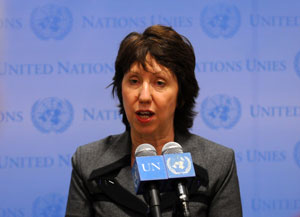The European Union has suspended some travel restrictions on 87 top Burmese officials, including the president, vice presidents, members of parliament and their family members. The officials remain subject to an EU asset freeze.

The move is a reward following a high-level visit by the EU development commissioner who returned from Burma last week, saying the newly elected government had made remarkable democratic reforms.
The move follows the government's release of hundreds of political prisoners in January.
“We are hoping that [the sanctions easement] will encourage the regime in Burma-Myanmar to make further reforms and to release further prisoners,” said a EU spokesperson.
The group’s foreign policy chief, Catherine Ashton told Reuters there could be a further easing of sanctions, which target nearly a thousand firms and institutions with asset freezes, impose restrictions on hundreds of officials and include an arms embargo and investment bans.
“We have seen historic changes ... and we strongly encourage the authorities to continue this process,” Ashton said in a statement. The EU is expected to make a decision on easing by late April, she said, following the April 1 by-election in Burma.
“I will visit (Burma) in April after the by-elections, by which time I hope we will have had the chance to complete the review and to have made decisions at an EU level to respond to what I hope will be continued progress,” she told Reuters.
On Thursday, the World Bank issued a statement saying that it was in the process of returning to Burma, in an effort to help the previously isolated country integrate with the rest of the world. The International Monetary Fund has also begun working with Burmese officials in an effort to modernize its economic system and exchange rates.
Burma’s strategic location between India and China and its natural resources mean it is now regarded as an investment opportunity by its neighbours, particularly China, India and Thailand. One of the world’s poorest countries with an antiquated infrastructure, Burma is also being eyed by Japan, South Korea and Asean countries as a source of energy and cheap labour.
China, Thailand and India covet its energy resources, and see it as a strategic deep-sea port location, which can eliminate the need to send cargoes through the congested and vulnerable Malacca Strait, yet provide them access to Southeast Asia and the rest of the world.


